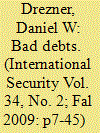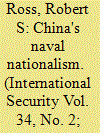| Srl | Item |
| 1 |
ID:
091422


|
|
|
|
|
| Publication |
2009.
|
| Summary/Abstract |
Commentators and policymakers have articulated growing concerns about U.S. dependence on China and other authoritarian capitalist states as a source of credit to fund the United States' trade and budget deficits. What are the security implications of China's creditor status? If Beijing or another sovereign creditor were to flex its financial muscles, would Washington buckle? The answer can be drawn from the existing literature on economic statecraft. An appraisal of the ability of creditor states to convert their financial power into political power suggests that the power of credit has been moderately exaggerated in policy circles.
|
|
|
|
|
|
|
|
|
|
|
|
|
|
|
|
| 2 |
ID:
091423


|
|
|
|
|
| Publication |
2009.
|
| Summary/Abstract |
Recent developments in Chinese politics and defense policy indicate that China will soon embark on an ambitious maritime policy that will include construction of a power-projection navy centered on an aircraft carrier. But just as nationalism and the pursuit of status encouraged past land powers to seek great power maritime capabilities, widespread nationalism, growing social instability, and the leadership's concern for its political legitimacy drive China's naval ambition. China's maritime power, however, will be limited by the constraints experienced by all land powers: enduring challenges to Chinese territorial security and a corresponding commitment to a large ground force capability will constrain China's naval capabilities and its potential challenge to U.S. maritime security. Nonetheless, China's naval nationalism will challenge U.S.-China cooperation. It will likely elicit increased U.S. naval spending and deployments, as well as politicization of China policy in the United States, challenging the United States to develop policy to manage U.S.-China naval competition to allow for continued political cooperation.
|
|
|
|
|
|
|
|
|
|
|
|
|
|
|
|
| 3 |
ID:
091426


|
|
|
|
|
| Publication |
2009.
|
| Summary/Abstract |
Scholars have argued for centuries about the relative importance of religion in determining behavior. Do actors with genuine religious beliefs, both leaders and foot soldiers, actually fight wars and commit atrocities in the name of religion and religious institutions? Or is religion a proxy for materialist variables such as land grabs or wealth creation? A case study of the Catholic Crusading movement and an evaluation of Crusading as an institution demonstrate that religiously motivated military campaigns, when decisive conclusions are not possible, may last longer than other campaigns because of the nonmaterial reasons for continuing to fight.
|
|
|
|
|
|
|
|
|
|
|
|
|
|
|
|
| 4 |
ID:
091425


|
|
|
|
|
| Publication |
2009.
|
| Summary/Abstract |
When and why do great powers seek to transform foreign institutions and societies through military interventions? What role does executive leadership play in influencing the choice of intervention strategy, especially the degree to which an intervention interferes in the domestic institutions of the target state? A typology of political leaders based on whether they believe that the internal characteristics of other states are the ultimate source of threats indicates that these threat perceptions shape the cost-benefit calculation leaders make when they confront intervention decisions; they also have important consequences for how states intervene. A comparison of the beliefs of President John F. Kennedy and President Lyndon B. Johnson, as well as their decision-making during the Vietnam War, illustrates how the theory operates.
|
|
|
|
|
|
|
|
|
|
|
|
|
|
|
|
| 5 |
ID:
091424


|
|
|
|
|
| Publication |
2009.
|
| Summary/Abstract |
Does territorial partition of countries in civil wars help to end these wars, reducing the risk of recurrence? Researchers have proposed territorial partition with or without formal recognition of sovereignty as a solution to civil wars and a way to create self-enforcing peace. Quantitative studies of the effect of partition on the risk of renewed civil war, however, suffer several main shortcomings, including conflicting results in the extant literature that result mainly from data coding differences, selective use of case histories, and methodological problems. A new data set and a benchmark empirical analysis find that, on average, partition is unlikely to reduce the risk of a return to civil war and, in some cases, may increase that risk.
|
|
|
|
|
|
|
|
|
|
|
|
|
|
|
|